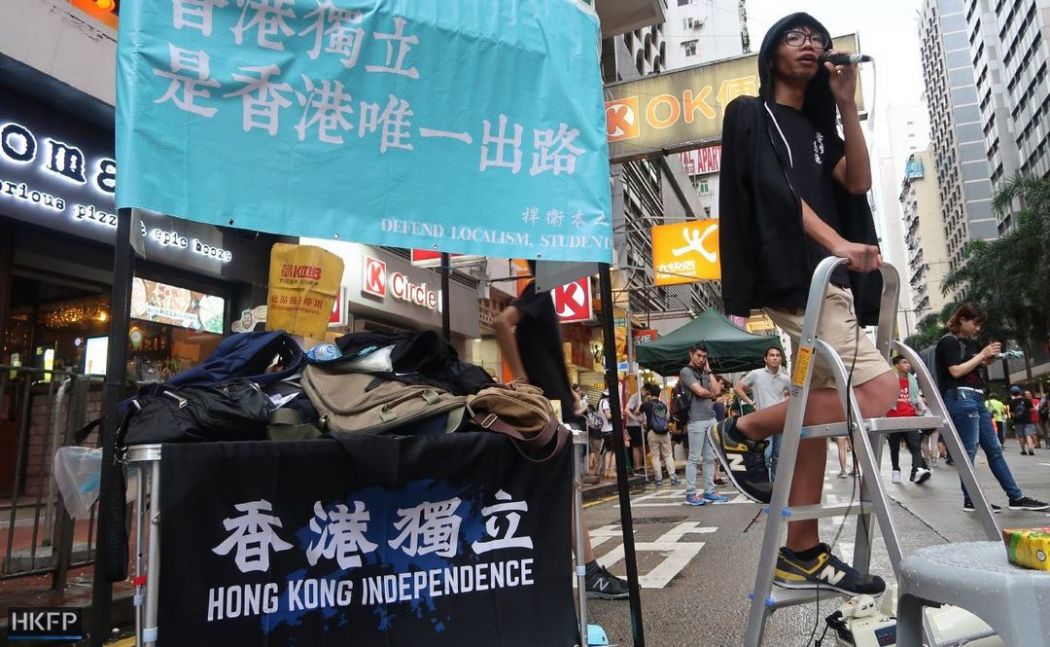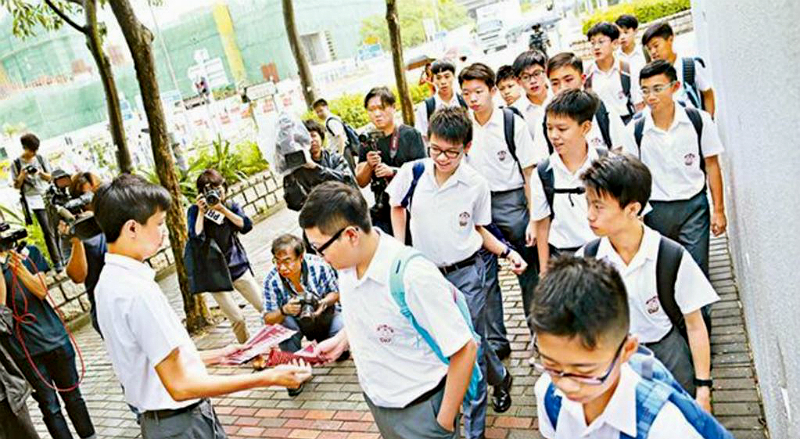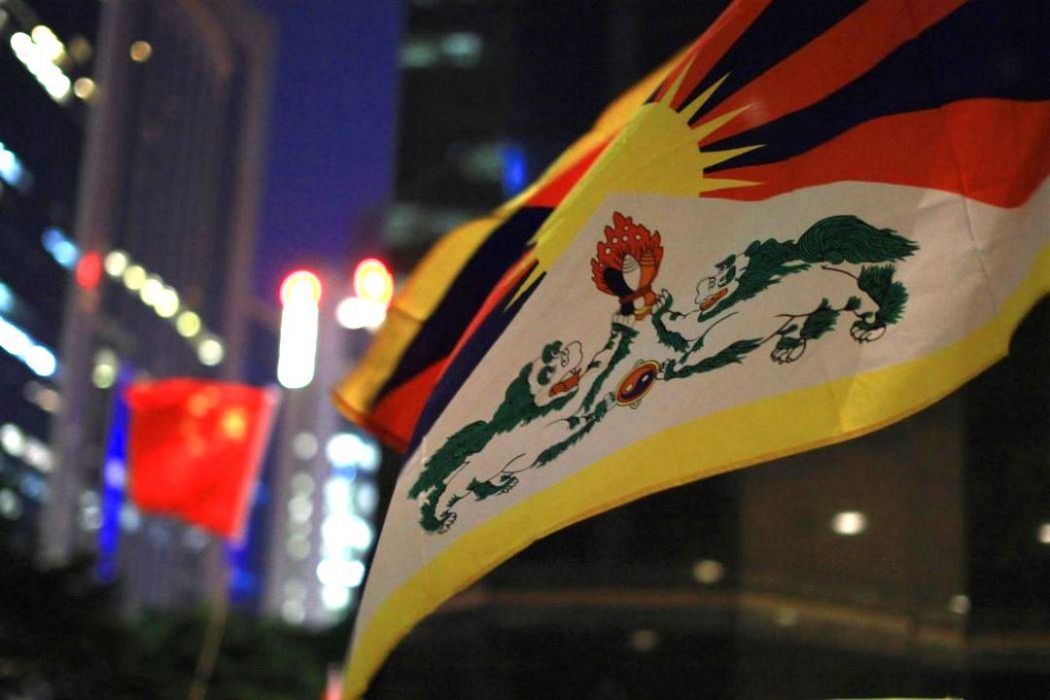Some would say that Tony Chung Hon-lam, a 16-year-old activist whose avowed goal is independence for Hong Kong, was the inspiration for pro-independence groups in schools. But he thinks this honour should be bestowed on former chief executive Leung Chun-ying.
Soon after the prominent student group Scholarism suspended its operations last March as it transformed into political party Demosisto, Chung took the opportunity to announce a new group called “Student Localism.” It involved months of planning with a handful of other students.
The new group tried to recruit fellow students to form localist groups in schools and run for student union seats. The task turned out to be a struggle – a post on Facebook yielded little response.

“We wanted to find students to hand out pamphlets, and student unions to host some forums to discuss the future of Hong Kong,” he said. “We tried hard to find students from different schools to see if they were interested. Most of them said they are not interested, or they don’t have time, and so on.”
But it did attract media attention and led to a report in the Ming Pao newspaper, after which students started to spontaneously form a handful of groups on the basis of Chung’s model.
The movement really took off after it was denounced by then-chief executive Leung Chun-ying in August. Leung claimed that discussion of independence from China in schools was “absolutely not a matter of freedom of speech,” and students could be kicked out of school for discussing it, comparing such debate to uttering foul language.

Chung was even featured in a front-page “investigative report” in the pro-Beijing Wen Wei Po newspaper criticising him. “Then more media reported it, more students learned of it and said they wanted to [form their own group],” he said.
After that, dozens of localist groups in schools were formed, mostly under the banner of supporting Hong Kong independence. The most high-profile action came on the first day of school on September 1, when students handed out pro-independence stickers and pamphlets outside schools all over Hong Kong.

It came about a week after Leung’s comments – plus, it was the first day of school – traditionally a much-reported event across local media. It was uncommon in the past for students to campaign outside school grounds.
Some schools were relatively tolerant, such as Ying Wa College, whose principal allowed students to continue their actions outside school gates, and promised Hong Kong independence could be discussed during liberal studies lessons.
But some students were stopped by teaching staff outside school gates. A student at the ELCHK Yuen Long Lutheran Secondary School was ordered to meet with the principal and teachers for several hours. The student then showed up with some teachers at a press conference, where he said in a slightly wavering voice that “there was absolutely no pressure” during the meeting and he was not told what to say.

Elimination method
Chung said the reason for his support of independence was simple.
“I was born here, I grew up here. We often see the situation in China – it’s exactly why we do not want the place we live to become the same as China,” he said.
Asked about what he thinks are the differences between Hong Kong and China, Chung said protesters during the pro-democracy Occupy movement in 2014 could at least receive a reasonable trial.
“But those who voiced support for us in China, who merely raised a yellow umbrella, or a banner saying ‘I want genuine universal suffrage’ – they were sentenced to jail for several years,” he said.

Unlike most politically active youngsters, Chung said his moment of political awakening was not the Occupy movement in 2014 or the national education row which preceded it in 2012, but a minor demonstration outside the PLA headquarters in Central in late 2013. He was then 12.
His first direct involvement in politics came in 2016, when he met his group’s co-founder over Instagram.
They joined the campaign for localist candidate Edward Leung Tin-kei in the by-election for the Legislative Council that February. Leung received more than 66,000 votes – or 15 per cent of the total vote count.
“It was then I realised Hong Kong independence is the only way out,” Chung said, explaining his political stance through a process of elimination.
To him, the “One Country, Two Systems” principle that promised to safeguard Hong Kong’s autonomy has been “modified and interpreted at will” by the Chinese government.

Returning to the UK was not an option, he said. “The UK still says the ‘One Country, Two Systems’ principle is working well – I realise the UK does not care about Hong Kong anymore. Our situation is so bad, but the UK is still lying.”
Another option was proposed by scholar Chin Wan-kan, who suggested Hong Kong should become an autonomous city-state, in a confederation with China and other East Asian countries, to ensure a separate but mutually dependent relationship with the mainland while safeguarding Hong Kong’s position.
Chung agreed there were advantages to this proposal. “Some part of our food comes from China – if we go independent and engage in a hostile relationship with China, then we have to face the issue of how to find food to replace that from China,” he said. “We would not need to solve this issue if we are still in the same system depending on each other.”
“If building an autonomous city-state is possible, it could even be better than independence. But the political reality is the Chinese Communist Party would not let us.”

He recalled the example of Tibet, which signed the Seventeen Points Agreement with Beijing, but achieved neither freedom nor democracy in the end: “The democracy we try to achieve in Hong Kong will never be secure if we are under Chinese rule.”
The only true option left for Hong Kong, Chung said, would be independence, however difficult it may be.
Downfall
Chung says that there are several factors which caused the plan to promote pro-independence thought in schools to “fail.”
Many pro-independence candidates were barred from running in the Legislative Council election last year, including Edward Leung, who had to distance himself from past pro-independence statements. Some localist candidates won, but soon they also found themselves in trouble.
Two localist lawmakers were disqualified after they pronounced “China” using a term that some found derogatory during their oaths of office. The government filed a legal challenge and subsequently Beijing issued an interpretation of the Basic Law to ensure they would lose the case.
“After this controversy, there were fewer people who took our pamphlets,” Chung recalled.

Another issue was that most students are not very politically aware. The four or five core members who co-founded Chung’s group were actually an exception among students.
“Compared with the general public, students indeed care less about our street stands and talk less to us,” he said.
He admitted that it was difficult to convince the public of their political stance through one conversation on the street: “But our feeling is that they will understand our stance better.”
Chung also said there was a split among the student localist concern groups. Many chose to join the high-profile Hong Kong National Party (HKNP) in activities, but they stayed in his group’s message groups, sometimes sparking internal fights and confusion.
“Sometimes these concern groups ask for our opinion, then they ask for [HKNP’s] opinion, and work things out on their own – this affected us a lot,” Chung said. “A lot of these groups just stopped doing anything in the end.”
“Some groups even said we wanted to control them,” he added. “Because of the complicated relationship, it’s not effective anymore, so we decided to stop it,” he added.

Chung said sometimes they had to face difficult choices.
“We don’t have the ability to mobilise people to the frontline [of protests]. Personally, I don’t like to be the one speaking with a microphone, I don’t like to hand out pamphlets, I don’t like to do online talk shows. I would rather be at the protest scenes… but I do these things because no one else will.”
But Chung said he believed the localists will thrive again, after its first quick rise and fall.
“All in all, this is just the beginning. We still have a lot to learn,” he said.
Leaving?
Chung said his parents sometimes ask him if he would like to study in Australia, or migrate overseas as some of their relatives have done.
“If you asked me six months ago, I wouldn’t leave – I am the generation to make changes, I am staying because I don’t want [Hong Kong] to become China,” he said.

But considering the political struggle in the past six months and the upcoming term of the new chief executive Carrie Lam, the choice has become more complicated for Chung.
“In the next five years the national security law may be enacted, or I may be charged with some offence… I can’t say it is a must for me to stay,” he said.
“Even historically, there was Sun Yat-sen, he would leave [China] if it was necessary. Leaving does not mean giving up what we do, but rather that we can continue doing what we do because we left.”

